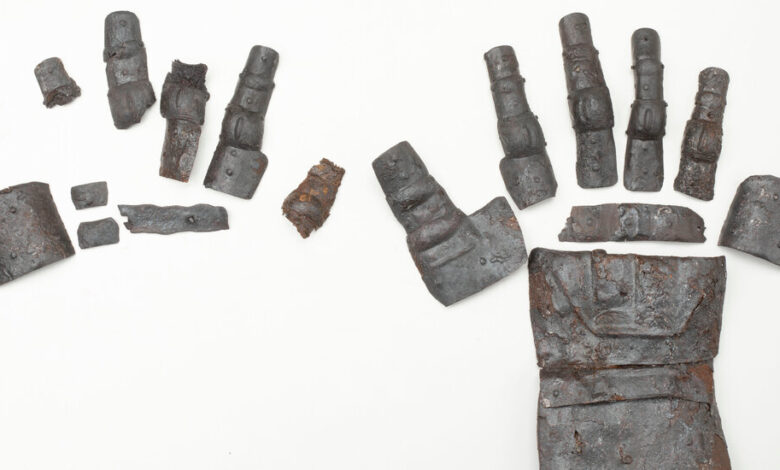
[ad_1]
A medieval knight returns to a Swiss castle after a victorious battle. With a hearty whoop he tosses aside his prized gauntlets at the blacksmith shop. As he rushes off to a celebratory feast, they sit out of sight in a dark corner. Not too long after, a fire breaks out, the shop is destroyed and the gauntlets are lost for more than 600 years.
OK, so maybe it didn’t happen that way. But maybe it did. When an astonishingly well preserved piece of armor from so long ago is rediscovered, it’s hard not to speculate a little romantically about its origins.
Demolition work near Kyburg Castle, northeast of Zurich, threatened a site that was known to be the location of a medieval town. So a rescue excavation was carried out in the winter of 2021 and early 2022. “We knew that all the archaeological remains in the ground would be destroyed during this construction work,” said Lorena Burkhardt, the excavation leader.
Excavators unearthed a weaving cellar that had burned down in the 14th century. Much of what was found was prosaic: a hammer, tongs, tweezers, keys. But it was enough to indicate that blacksmith work had also been done in the area.
And then there was the big find. A nearly complete right-handed iron glove from the 14th century, as well as some pieces from a left-handed one. Nearly every other gauntlet found over the years has been from a later period, according to Zurich Cantonal Archaeology, the body of experts employed by the local government, who announced the find this month. And while a few from the 14th century have turned up in Switzerland, “none of these pieces is anywhere near as well preserved and shows as many details of design and decoration as the Kyburg gauntlet,” the group said.
The gauntlet would likely have been worn by a medieval soldier or a knight, but so far it’s unclear who wore it and for what purpose.
“We know of tombstones of knights from the 14th century who wore similar gauntlets,” Ms. Burkhardt said. “Ultimately, however, we cannot say whether the gauntlets were actually made for a knight or for someone else who needed to equip himself for war.”
But there are clues pointing to the wearer’s high status. “What is certain is that the gloves were made to a high standard and the purchase of such pieces of armor was correspondingly expensive,” Ms. Burkhardt said. “It is therefore likely that the gloves were intended for a noble or other high-ranking person.”
The fingers of the gauntlet fold in four places to allow for movement; individual iron plates are layered atop each other and connected with rivets. Material inside the gauntlet would have been leather or textile.
“It is also remarkable how well preserved the piece is,” Ms. Burkhardt said. “Apart from one break, all the iron components of the right hand are completely preserved.”
“The fact that we found the plates of the gauntlet together with these other objects indicates that the piece of armor was made in the smithy,” Ms. Burkhardt said. “It is also possible that it was in the workshop for repair, although we have not yet been able to detect any obvious damage or traces of repair.”
The gauntlet will be displayed at Kyburg Castle for three weeks in September. “We are only at the beginning of researching the object,” Ms. Burkhardt said.
Even when such an exceptional find is made, not every historical question is answered. Guesswork and sometimes legend are used to fill in the blanks.
The most famous Swiss knight of the period was Heinrich von Winkelried. Although records show a knight by that name did exist, the tale of him killing a dragon single-handedly with a spear is, of course, not true. And surely the recently found gauntlet did not belong to him.
Right?
Source link




